International HRM: Cultural and HRM Issues Faced by UK Companies While Expanding Globally
VerifiedAdded on 2023/06/17
|11
|3353
|72
AI Summary
This report discusses the challenges faced by International HRM while expanding business globally, including cultural and HRM issues faced by UK companies. It also highlights the benefits of cross-culture to organizations and the role of international human resources management. The report covers topics such as cultural diversity, training and development, compensation and benefits, and dealing with multiple organizations. Subject: International HRM, Course Code: N/A, Course Name: N/A, College/University: N/A
Contribute Materials
Your contribution can guide someone’s learning journey. Share your
documents today.

International HRM
Secure Best Marks with AI Grader
Need help grading? Try our AI Grader for instant feedback on your assignments.
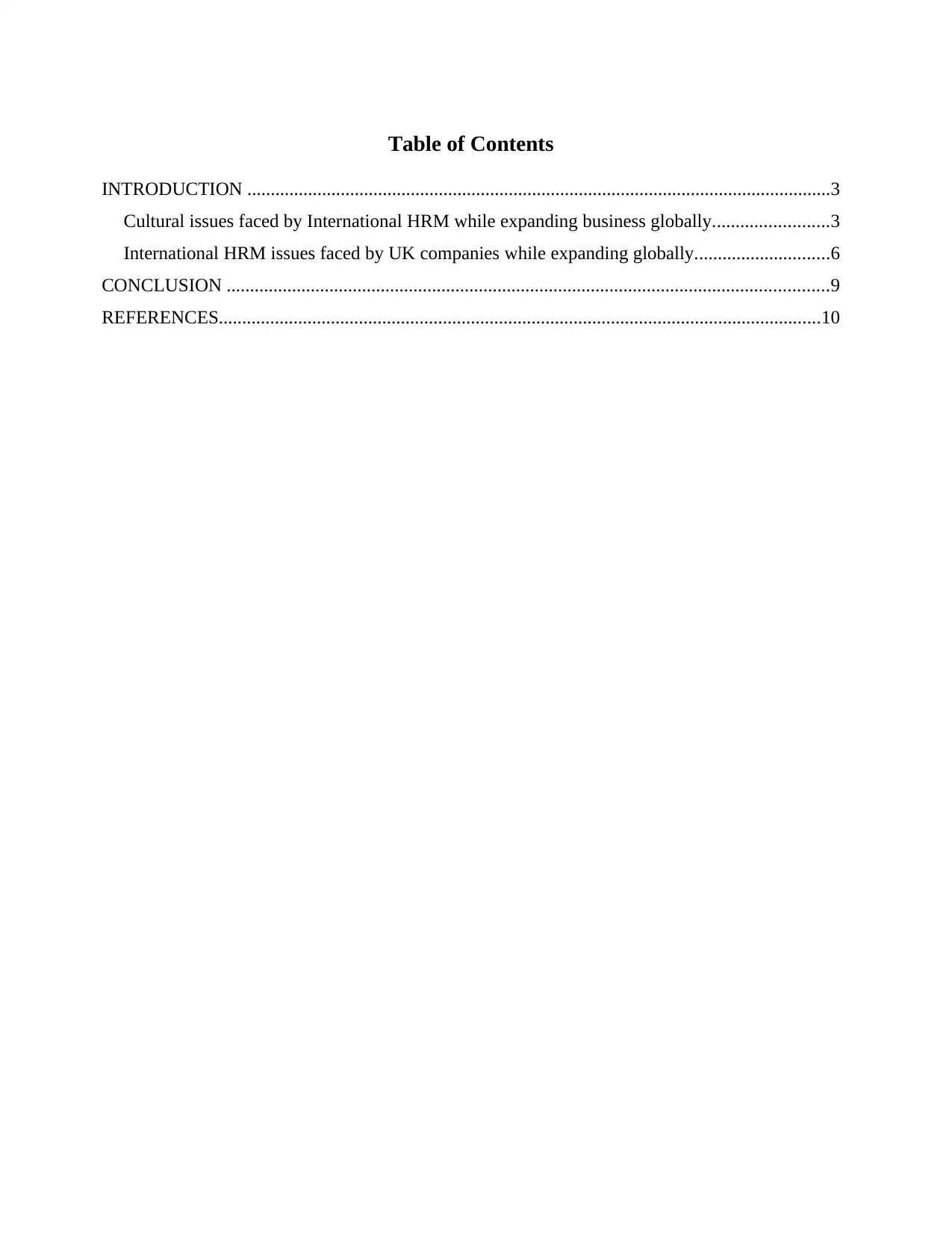
Table of Contents
INTRODUCTION .............................................................................................................................3
Cultural issues faced by International HRM while expanding business globally.........................3
International HRM issues faced by UK companies while expanding globally.............................6
CONCLUSION .................................................................................................................................9
REFERENCES.................................................................................................................................10
INTRODUCTION .............................................................................................................................3
Cultural issues faced by International HRM while expanding business globally.........................3
International HRM issues faced by UK companies while expanding globally.............................6
CONCLUSION .................................................................................................................................9
REFERENCES.................................................................................................................................10
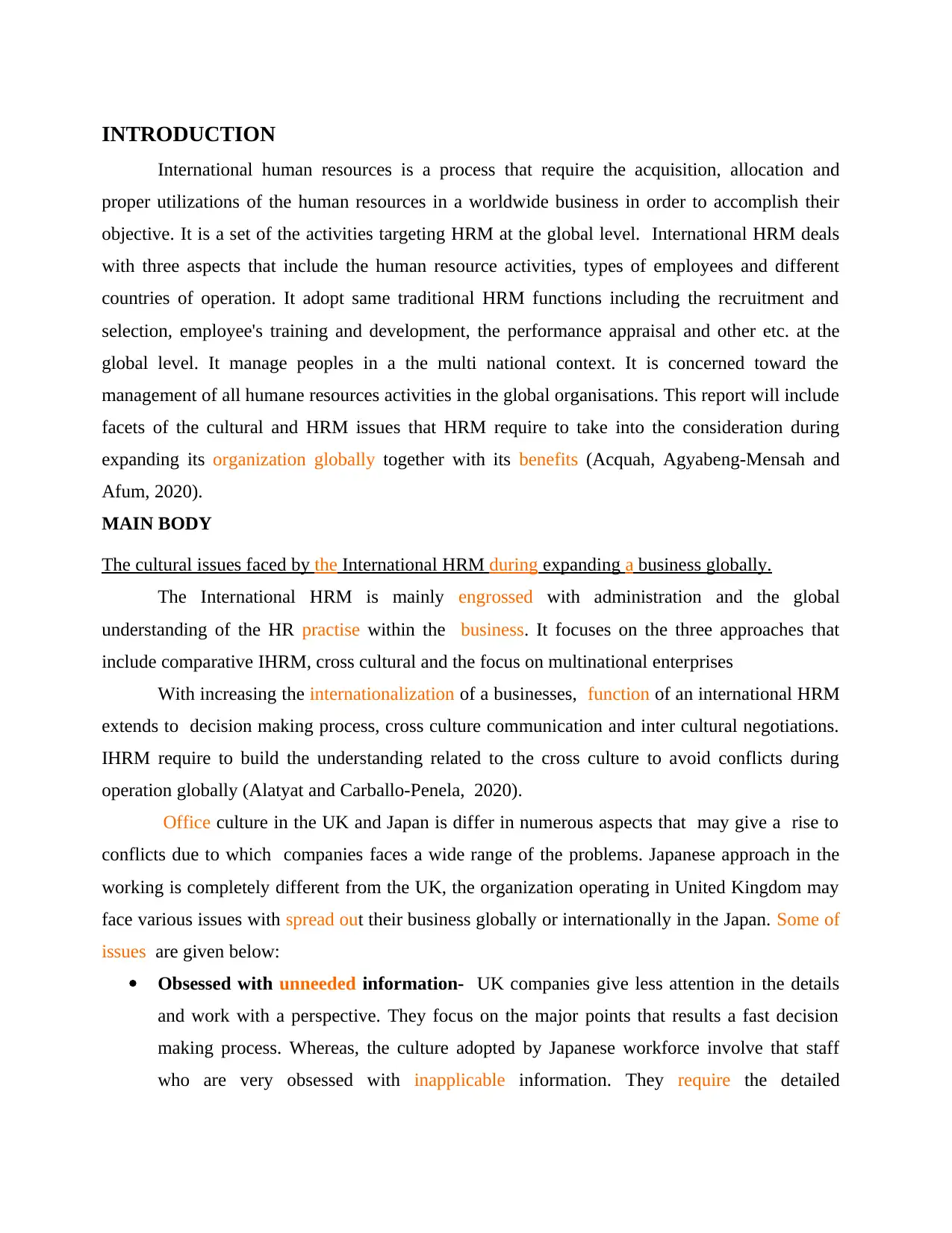
INTRODUCTION
International human resources is a process that require the acquisition, allocation and
proper utilizations of the human resources in a worldwide business in order to accomplish their
objective. It is a set of the activities targeting HRM at the global level. International HRM deals
with three aspects that include the human resource activities, types of employees and different
countries of operation. It adopt same traditional HRM functions including the recruitment and
selection, employee's training and development, the performance appraisal and other etc. at the
global level. It manage peoples in a the multi national context. It is concerned toward the
management of all humane resources activities in the global organisations. This report will include
facets of the cultural and HRM issues that HRM require to take into the consideration during
expanding its organization globally together with its benefits (Acquah, Agyabeng-Mensah and
Afum, 2020).
MAIN BODY
The cultural issues faced by the International HRM during expanding a business globally.
The International HRM is mainly engrossed with administration and the global
understanding of the HR practise within the business. It focuses on the three approaches that
include comparative IHRM, cross cultural and the focus on multinational enterprises
With increasing the internationalization of a businesses, function of an international HRM
extends to decision making process, cross culture communication and inter cultural negotiations.
IHRM require to build the understanding related to the cross culture to avoid conflicts during
operation globally (Alatyat and Carballo-Penela, 2020).
Office culture in the UK and Japan is differ in numerous aspects that may give a rise to
conflicts due to which companies faces a wide range of the problems. Japanese approach in the
working is completely different from the UK, the organization operating in United Kingdom may
face various issues with spread out their business globally or internationally in the Japan. Some of
issues are given below:
Obsessed with unneeded information- UK companies give less attention in the details
and work with a perspective. They focus on the major points that results a fast decision
making process. Whereas, the culture adopted by Japanese workforce involve that staff
who are very obsessed with inapplicable information. They require the detailed
International human resources is a process that require the acquisition, allocation and
proper utilizations of the human resources in a worldwide business in order to accomplish their
objective. It is a set of the activities targeting HRM at the global level. International HRM deals
with three aspects that include the human resource activities, types of employees and different
countries of operation. It adopt same traditional HRM functions including the recruitment and
selection, employee's training and development, the performance appraisal and other etc. at the
global level. It manage peoples in a the multi national context. It is concerned toward the
management of all humane resources activities in the global organisations. This report will include
facets of the cultural and HRM issues that HRM require to take into the consideration during
expanding its organization globally together with its benefits (Acquah, Agyabeng-Mensah and
Afum, 2020).
MAIN BODY
The cultural issues faced by the International HRM during expanding a business globally.
The International HRM is mainly engrossed with administration and the global
understanding of the HR practise within the business. It focuses on the three approaches that
include comparative IHRM, cross cultural and the focus on multinational enterprises
With increasing the internationalization of a businesses, function of an international HRM
extends to decision making process, cross culture communication and inter cultural negotiations.
IHRM require to build the understanding related to the cross culture to avoid conflicts during
operation globally (Alatyat and Carballo-Penela, 2020).
Office culture in the UK and Japan is differ in numerous aspects that may give a rise to
conflicts due to which companies faces a wide range of the problems. Japanese approach in the
working is completely different from the UK, the organization operating in United Kingdom may
face various issues with spread out their business globally or internationally in the Japan. Some of
issues are given below:
Obsessed with unneeded information- UK companies give less attention in the details
and work with a perspective. They focus on the major points that results a fast decision
making process. Whereas, the culture adopted by Japanese workforce involve that staff
who are very obsessed with inapplicable information. They require the detailed
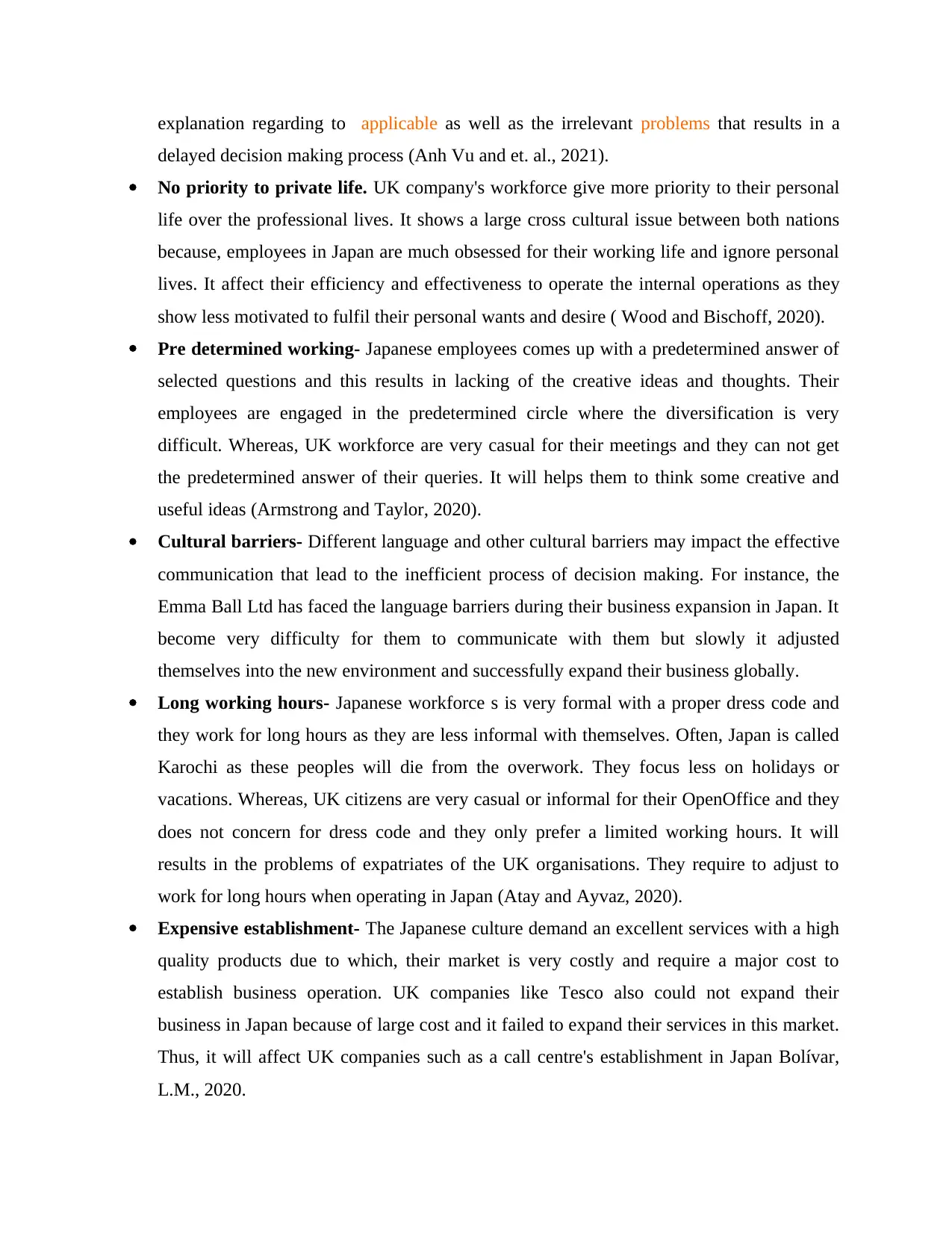
explanation regarding to applicable as well as the irrelevant problems that results in a
delayed decision making process (Anh Vu and et. al., 2021).
No priority to private life. UK company's workforce give more priority to their personal
life over the professional lives. It shows a large cross cultural issue between both nations
because, employees in Japan are much obsessed for their working life and ignore personal
lives. It affect their efficiency and effectiveness to operate the internal operations as they
show less motivated to fulfil their personal wants and desire ( Wood and Bischoff, 2020).
Pre determined working- Japanese employees comes up with a predetermined answer of
selected questions and this results in lacking of the creative ideas and thoughts. Their
employees are engaged in the predetermined circle where the diversification is very
difficult. Whereas, UK workforce are very casual for their meetings and they can not get
the predetermined answer of their queries. It will helps them to think some creative and
useful ideas (Armstrong and Taylor, 2020).
Cultural barriers- Different language and other cultural barriers may impact the effective
communication that lead to the inefficient process of decision making. For instance, the
Emma Ball Ltd has faced the language barriers during their business expansion in Japan. It
become very difficulty for them to communicate with them but slowly it adjusted
themselves into the new environment and successfully expand their business globally.
Long working hours- Japanese workforce s is very formal with a proper dress code and
they work for long hours as they are less informal with themselves. Often, Japan is called
Karochi as these peoples will die from the overwork. They focus less on holidays or
vacations. Whereas, UK citizens are very casual or informal for their OpenOffice and they
does not concern for dress code and they only prefer a limited working hours. It will
results in the problems of expatriates of the UK organisations. They require to adjust to
work for long hours when operating in Japan (Atay and Ayvaz, 2020).
Expensive establishment- The Japanese culture demand an excellent services with a high
quality products due to which, their market is very costly and require a major cost to
establish business operation. UK companies like Tesco also could not expand their
business in Japan because of large cost and it failed to expand their services in this market.
Thus, it will affect UK companies such as a call centre's establishment in Japan Bolívar,
L.M., 2020.
delayed decision making process (Anh Vu and et. al., 2021).
No priority to private life. UK company's workforce give more priority to their personal
life over the professional lives. It shows a large cross cultural issue between both nations
because, employees in Japan are much obsessed for their working life and ignore personal
lives. It affect their efficiency and effectiveness to operate the internal operations as they
show less motivated to fulfil their personal wants and desire ( Wood and Bischoff, 2020).
Pre determined working- Japanese employees comes up with a predetermined answer of
selected questions and this results in lacking of the creative ideas and thoughts. Their
employees are engaged in the predetermined circle where the diversification is very
difficult. Whereas, UK workforce are very casual for their meetings and they can not get
the predetermined answer of their queries. It will helps them to think some creative and
useful ideas (Armstrong and Taylor, 2020).
Cultural barriers- Different language and other cultural barriers may impact the effective
communication that lead to the inefficient process of decision making. For instance, the
Emma Ball Ltd has faced the language barriers during their business expansion in Japan. It
become very difficulty for them to communicate with them but slowly it adjusted
themselves into the new environment and successfully expand their business globally.
Long working hours- Japanese workforce s is very formal with a proper dress code and
they work for long hours as they are less informal with themselves. Often, Japan is called
Karochi as these peoples will die from the overwork. They focus less on holidays or
vacations. Whereas, UK citizens are very casual or informal for their OpenOffice and they
does not concern for dress code and they only prefer a limited working hours. It will
results in the problems of expatriates of the UK organisations. They require to adjust to
work for long hours when operating in Japan (Atay and Ayvaz, 2020).
Expensive establishment- The Japanese culture demand an excellent services with a high
quality products due to which, their market is very costly and require a major cost to
establish business operation. UK companies like Tesco also could not expand their
business in Japan because of large cost and it failed to expand their services in this market.
Thus, it will affect UK companies such as a call centre's establishment in Japan Bolívar,
L.M., 2020.
Secure Best Marks with AI Grader
Need help grading? Try our AI Grader for instant feedback on your assignments.
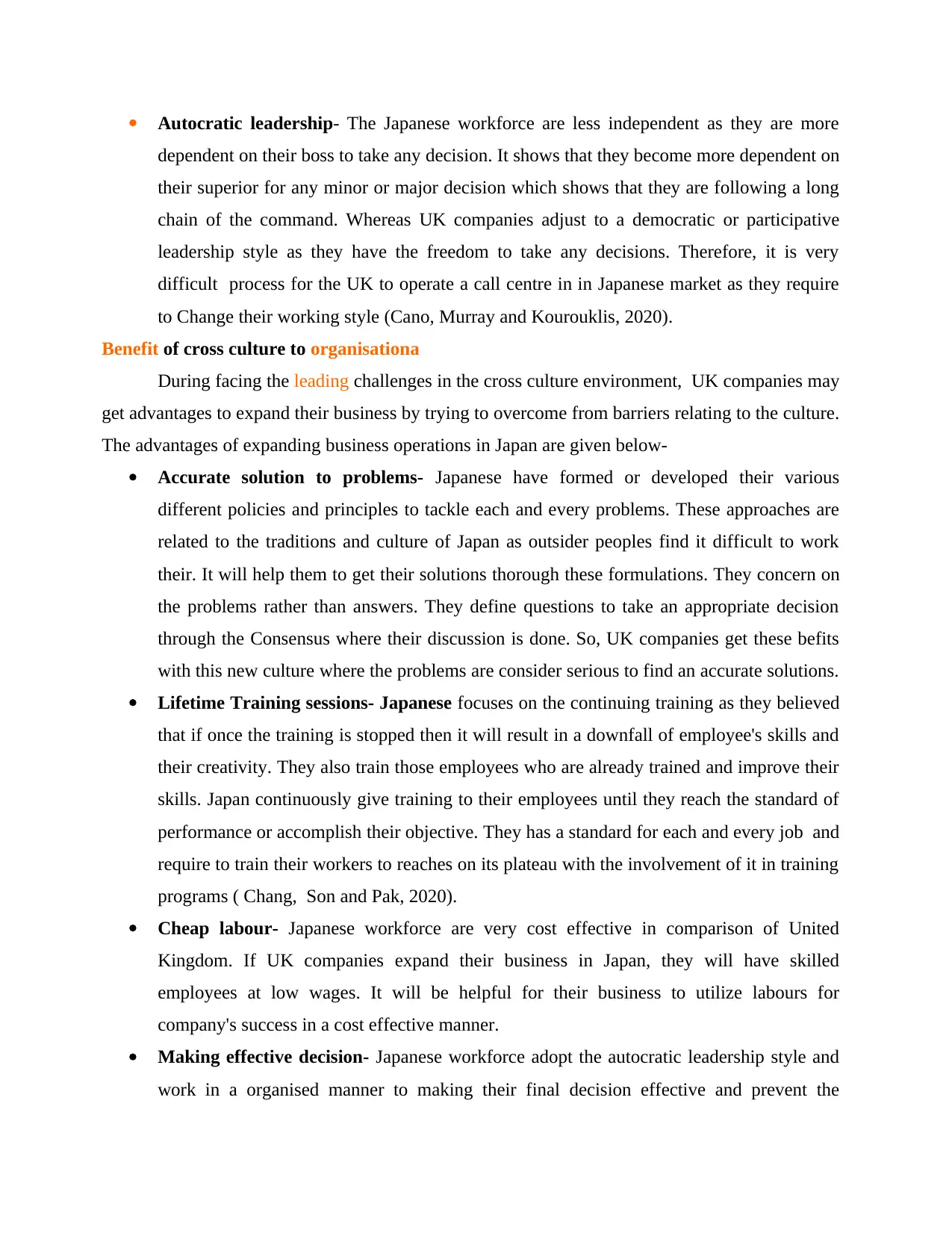
Autocratic leadership- The Japanese workforce are less independent as they are more
dependent on their boss to take any decision. It shows that they become more dependent on
their superior for any minor or major decision which shows that they are following a long
chain of the command. Whereas UK companies adjust to a democratic or participative
leadership style as they have the freedom to take any decisions. Therefore, it is very
difficult process for the UK to operate a call centre in in Japanese market as they require
to Change their working style (Cano, Murray and Kourouklis, 2020).
Benefit of cross culture to organisationa
During facing the leading challenges in the cross culture environment, UK companies may
get advantages to expand their business by trying to overcome from barriers relating to the culture.
The advantages of expanding business operations in Japan are given below-
Accurate solution to problems- Japanese have formed or developed their various
different policies and principles to tackle each and every problems. These approaches are
related to the traditions and culture of Japan as outsider peoples find it difficult to work
their. It will help them to get their solutions thorough these formulations. They concern on
the problems rather than answers. They define questions to take an appropriate decision
through the Consensus where their discussion is done. So, UK companies get these befits
with this new culture where the problems are consider serious to find an accurate solutions.
Lifetime Training sessions- Japanese focuses on the continuing training as they believed
that if once the training is stopped then it will result in a downfall of employee's skills and
their creativity. They also train those employees who are already trained and improve their
skills. Japan continuously give training to their employees until they reach the standard of
performance or accomplish their objective. They has a standard for each and every job and
require to train their workers to reaches on its plateau with the involvement of it in training
programs ( Chang, Son and Pak, 2020).
Cheap labour- Japanese workforce are very cost effective in comparison of United
Kingdom. If UK companies expand their business in Japan, they will have skilled
employees at low wages. It will be helpful for their business to utilize labours for
company's success in a cost effective manner.
Making effective decision- Japanese workforce adopt the autocratic leadership style and
work in a organised manner to making their final decision effective and prevent the
dependent on their boss to take any decision. It shows that they become more dependent on
their superior for any minor or major decision which shows that they are following a long
chain of the command. Whereas UK companies adjust to a democratic or participative
leadership style as they have the freedom to take any decisions. Therefore, it is very
difficult process for the UK to operate a call centre in in Japanese market as they require
to Change their working style (Cano, Murray and Kourouklis, 2020).
Benefit of cross culture to organisationa
During facing the leading challenges in the cross culture environment, UK companies may
get advantages to expand their business by trying to overcome from barriers relating to the culture.
The advantages of expanding business operations in Japan are given below-
Accurate solution to problems- Japanese have formed or developed their various
different policies and principles to tackle each and every problems. These approaches are
related to the traditions and culture of Japan as outsider peoples find it difficult to work
their. It will help them to get their solutions thorough these formulations. They concern on
the problems rather than answers. They define questions to take an appropriate decision
through the Consensus where their discussion is done. So, UK companies get these befits
with this new culture where the problems are consider serious to find an accurate solutions.
Lifetime Training sessions- Japanese focuses on the continuing training as they believed
that if once the training is stopped then it will result in a downfall of employee's skills and
their creativity. They also train those employees who are already trained and improve their
skills. Japan continuously give training to their employees until they reach the standard of
performance or accomplish their objective. They has a standard for each and every job and
require to train their workers to reaches on its plateau with the involvement of it in training
programs ( Chang, Son and Pak, 2020).
Cheap labour- Japanese workforce are very cost effective in comparison of United
Kingdom. If UK companies expand their business in Japan, they will have skilled
employees at low wages. It will be helpful for their business to utilize labours for
company's success in a cost effective manner.
Making effective decision- Japanese workforce adopt the autocratic leadership style and
work in a organised manner to making their final decision effective and prevent the
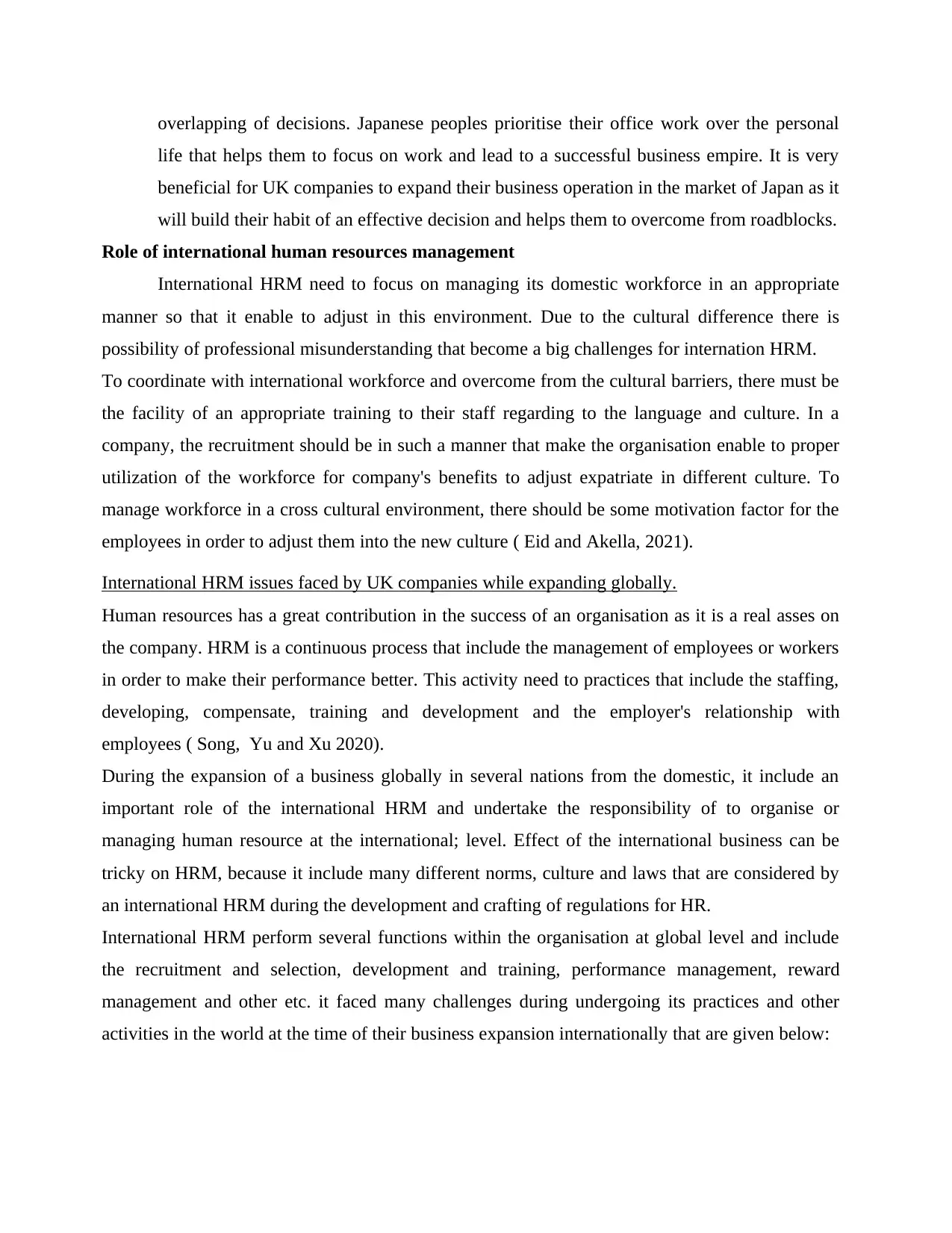
overlapping of decisions. Japanese peoples prioritise their office work over the personal
life that helps them to focus on work and lead to a successful business empire. It is very
beneficial for UK companies to expand their business operation in the market of Japan as it
will build their habit of an effective decision and helps them to overcome from roadblocks.
Role of international human resources management
International HRM need to focus on managing its domestic workforce in an appropriate
manner so that it enable to adjust in this environment. Due to the cultural difference there is
possibility of professional misunderstanding that become a big challenges for internation HRM.
To coordinate with international workforce and overcome from the cultural barriers, there must be
the facility of an appropriate training to their staff regarding to the language and culture. In a
company, the recruitment should be in such a manner that make the organisation enable to proper
utilization of the workforce for company's benefits to adjust expatriate in different culture. To
manage workforce in a cross cultural environment, there should be some motivation factor for the
employees in order to adjust them into the new culture ( Eid and Akella, 2021).
International HRM issues faced by UK companies while expanding globally.
Human resources has a great contribution in the success of an organisation as it is a real asses on
the company. HRM is a continuous process that include the management of employees or workers
in order to make their performance better. This activity need to practices that include the staffing,
developing, compensate, training and development and the employer's relationship with
employees ( Song, Yu and Xu 2020).
During the expansion of a business globally in several nations from the domestic, it include an
important role of the international HRM and undertake the responsibility of to organise or
managing human resource at the international; level. Effect of the international business can be
tricky on HRM, because it include many different norms, culture and laws that are considered by
an international HRM during the development and crafting of regulations for HR.
International HRM perform several functions within the organisation at global level and include
the recruitment and selection, development and training, performance management, reward
management and other etc. it faced many challenges during undergoing its practices and other
activities in the world at the time of their business expansion internationally that are given below:
life that helps them to focus on work and lead to a successful business empire. It is very
beneficial for UK companies to expand their business operation in the market of Japan as it
will build their habit of an effective decision and helps them to overcome from roadblocks.
Role of international human resources management
International HRM need to focus on managing its domestic workforce in an appropriate
manner so that it enable to adjust in this environment. Due to the cultural difference there is
possibility of professional misunderstanding that become a big challenges for internation HRM.
To coordinate with international workforce and overcome from the cultural barriers, there must be
the facility of an appropriate training to their staff regarding to the language and culture. In a
company, the recruitment should be in such a manner that make the organisation enable to proper
utilization of the workforce for company's benefits to adjust expatriate in different culture. To
manage workforce in a cross cultural environment, there should be some motivation factor for the
employees in order to adjust them into the new culture ( Eid and Akella, 2021).
International HRM issues faced by UK companies while expanding globally.
Human resources has a great contribution in the success of an organisation as it is a real asses on
the company. HRM is a continuous process that include the management of employees or workers
in order to make their performance better. This activity need to practices that include the staffing,
developing, compensate, training and development and the employer's relationship with
employees ( Song, Yu and Xu 2020).
During the expansion of a business globally in several nations from the domestic, it include an
important role of the international HRM and undertake the responsibility of to organise or
managing human resource at the international; level. Effect of the international business can be
tricky on HRM, because it include many different norms, culture and laws that are considered by
an international HRM during the development and crafting of regulations for HR.
International HRM perform several functions within the organisation at global level and include
the recruitment and selection, development and training, performance management, reward
management and other etc. it faced many challenges during undergoing its practices and other
activities in the world at the time of their business expansion internationally that are given below:
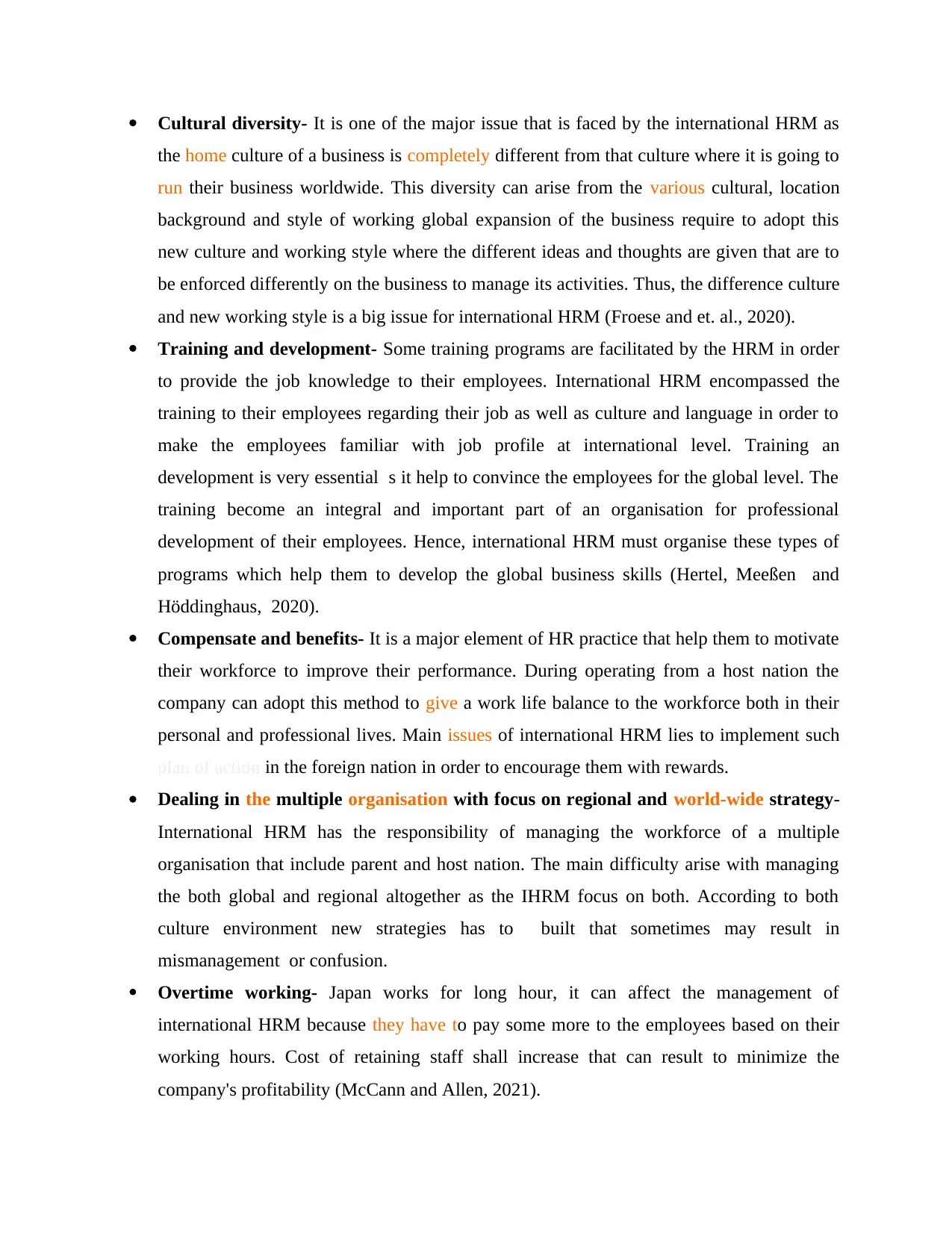
Cultural diversity- It is one of the major issue that is faced by the international HRM as
the home culture of a business is completely different from that culture where it is going to
run their business worldwide. This diversity can arise from the various cultural, location
background and style of working global expansion of the business require to adopt this
new culture and working style where the different ideas and thoughts are given that are to
be enforced differently on the business to manage its activities. Thus, the difference culture
and new working style is a big issue for international HRM (Froese and et. al., 2020).
Training and development- Some training programs are facilitated by the HRM in order
to provide the job knowledge to their employees. International HRM encompassed the
training to their employees regarding their job as well as culture and language in order to
make the employees familiar with job profile at international level. Training an
development is very essential s it help to convince the employees for the global level. The
training become an integral and important part of an organisation for professional
development of their employees. Hence, international HRM must organise these types of
programs which help them to develop the global business skills (Hertel, Meeßen and
Höddinghaus, 2020).
Compensate and benefits- It is a major element of HR practice that help them to motivate
their workforce to improve their performance. During operating from a host nation the
company can adopt this method to give a work life balance to the workforce both in their
personal and professional lives. Main issues of international HRM lies to implement such
plan of action in the foreign nation in order to encourage them with rewards.
Dealing in the multiple organisation with focus on regional and world-wide strategy-
International HRM has the responsibility of managing the workforce of a multiple
organisation that include parent and host nation. The main difficulty arise with managing
the both global and regional altogether as the IHRM focus on both. According to both
culture environment new strategies has to built that sometimes may result in
mismanagement or confusion.
Overtime working- Japan works for long hour, it can affect the management of
international HRM because they have to pay some more to the employees based on their
working hours. Cost of retaining staff shall increase that can result to minimize the
company's profitability (McCann and Allen, 2021).
the home culture of a business is completely different from that culture where it is going to
run their business worldwide. This diversity can arise from the various cultural, location
background and style of working global expansion of the business require to adopt this
new culture and working style where the different ideas and thoughts are given that are to
be enforced differently on the business to manage its activities. Thus, the difference culture
and new working style is a big issue for international HRM (Froese and et. al., 2020).
Training and development- Some training programs are facilitated by the HRM in order
to provide the job knowledge to their employees. International HRM encompassed the
training to their employees regarding their job as well as culture and language in order to
make the employees familiar with job profile at international level. Training an
development is very essential s it help to convince the employees for the global level. The
training become an integral and important part of an organisation for professional
development of their employees. Hence, international HRM must organise these types of
programs which help them to develop the global business skills (Hertel, Meeßen and
Höddinghaus, 2020).
Compensate and benefits- It is a major element of HR practice that help them to motivate
their workforce to improve their performance. During operating from a host nation the
company can adopt this method to give a work life balance to the workforce both in their
personal and professional lives. Main issues of international HRM lies to implement such
plan of action in the foreign nation in order to encourage them with rewards.
Dealing in the multiple organisation with focus on regional and world-wide strategy-
International HRM has the responsibility of managing the workforce of a multiple
organisation that include parent and host nation. The main difficulty arise with managing
the both global and regional altogether as the IHRM focus on both. According to both
culture environment new strategies has to built that sometimes may result in
mismanagement or confusion.
Overtime working- Japan works for long hour, it can affect the management of
international HRM because they have to pay some more to the employees based on their
working hours. Cost of retaining staff shall increase that can result to minimize the
company's profitability (McCann and Allen, 2021).
Paraphrase This Document
Need a fresh take? Get an instant paraphrase of this document with our AI Paraphraser
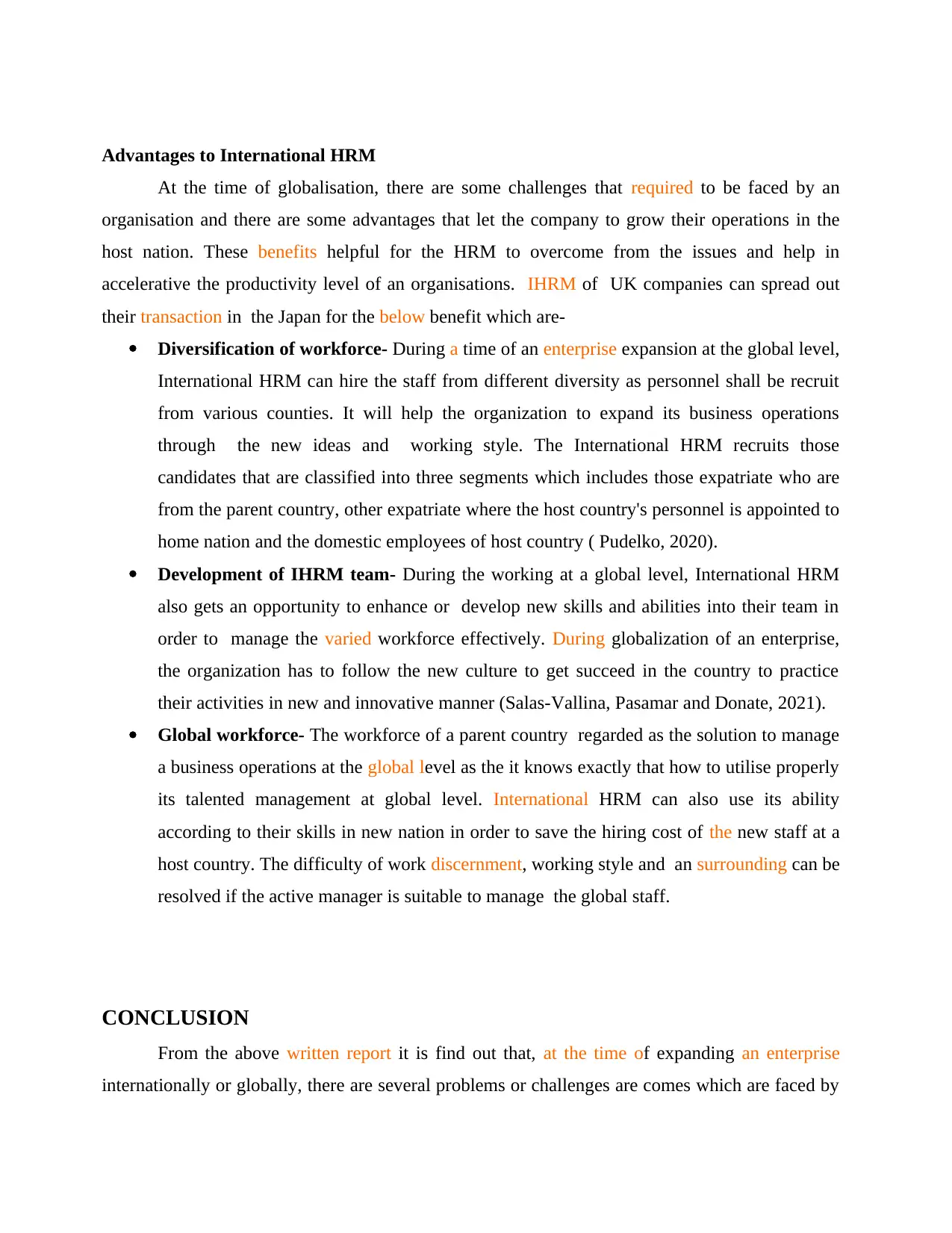
Advantages to International HRM
At the time of globalisation, there are some challenges that required to be faced by an
organisation and there are some advantages that let the company to grow their operations in the
host nation. These benefits helpful for the HRM to overcome from the issues and help in
accelerative the productivity level of an organisations. IHRM of UK companies can spread out
their transaction in the Japan for the below benefit which are-
Diversification of workforce- During a time of an enterprise expansion at the global level,
International HRM can hire the staff from different diversity as personnel shall be recruit
from various counties. It will help the organization to expand its business operations
through the new ideas and working style. The International HRM recruits those
candidates that are classified into three segments which includes those expatriate who are
from the parent country, other expatriate where the host country's personnel is appointed to
home nation and the domestic employees of host country ( Pudelko, 2020).
Development of IHRM team- During the working at a global level, International HRM
also gets an opportunity to enhance or develop new skills and abilities into their team in
order to manage the varied workforce effectively. During globalization of an enterprise,
the organization has to follow the new culture to get succeed in the country to practice
their activities in new and innovative manner (Salas-Vallina, Pasamar and Donate, 2021).
Global workforce- The workforce of a parent country regarded as the solution to manage
a business operations at the global level as the it knows exactly that how to utilise properly
its talented management at global level. International HRM can also use its ability
according to their skills in new nation in order to save the hiring cost of the new staff at a
host country. The difficulty of work discernment, working style and an surrounding can be
resolved if the active manager is suitable to manage the global staff.
CONCLUSION
From the above written report it is find out that, at the time of expanding an enterprise
internationally or globally, there are several problems or challenges are comes which are faced by
At the time of globalisation, there are some challenges that required to be faced by an
organisation and there are some advantages that let the company to grow their operations in the
host nation. These benefits helpful for the HRM to overcome from the issues and help in
accelerative the productivity level of an organisations. IHRM of UK companies can spread out
their transaction in the Japan for the below benefit which are-
Diversification of workforce- During a time of an enterprise expansion at the global level,
International HRM can hire the staff from different diversity as personnel shall be recruit
from various counties. It will help the organization to expand its business operations
through the new ideas and working style. The International HRM recruits those
candidates that are classified into three segments which includes those expatriate who are
from the parent country, other expatriate where the host country's personnel is appointed to
home nation and the domestic employees of host country ( Pudelko, 2020).
Development of IHRM team- During the working at a global level, International HRM
also gets an opportunity to enhance or develop new skills and abilities into their team in
order to manage the varied workforce effectively. During globalization of an enterprise,
the organization has to follow the new culture to get succeed in the country to practice
their activities in new and innovative manner (Salas-Vallina, Pasamar and Donate, 2021).
Global workforce- The workforce of a parent country regarded as the solution to manage
a business operations at the global level as the it knows exactly that how to utilise properly
its talented management at global level. International HRM can also use its ability
according to their skills in new nation in order to save the hiring cost of the new staff at a
host country. The difficulty of work discernment, working style and an surrounding can be
resolved if the active manager is suitable to manage the global staff.
CONCLUSION
From the above written report it is find out that, at the time of expanding an enterprise
internationally or globally, there are several problems or challenges are comes which are faced by
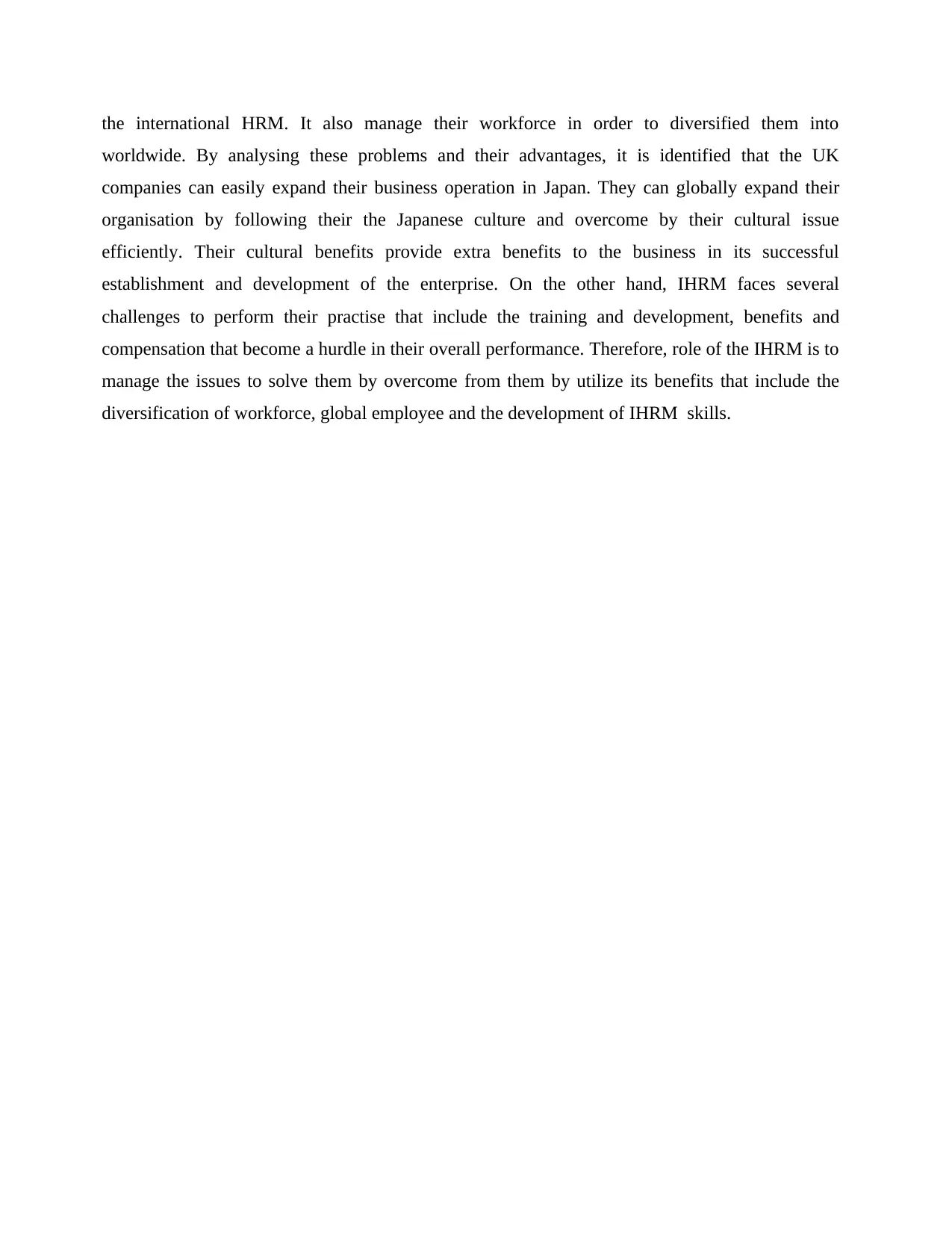
the international HRM. It also manage their workforce in order to diversified them into
worldwide. By analysing these problems and their advantages, it is identified that the UK
companies can easily expand their business operation in Japan. They can globally expand their
organisation by following their the Japanese culture and overcome by their cultural issue
efficiently. Their cultural benefits provide extra benefits to the business in its successful
establishment and development of the enterprise. On the other hand, IHRM faces several
challenges to perform their practise that include the training and development, benefits and
compensation that become a hurdle in their overall performance. Therefore, role of the IHRM is to
manage the issues to solve them by overcome from them by utilize its benefits that include the
diversification of workforce, global employee and the development of IHRM skills.
worldwide. By analysing these problems and their advantages, it is identified that the UK
companies can easily expand their business operation in Japan. They can globally expand their
organisation by following their the Japanese culture and overcome by their cultural issue
efficiently. Their cultural benefits provide extra benefits to the business in its successful
establishment and development of the enterprise. On the other hand, IHRM faces several
challenges to perform their practise that include the training and development, benefits and
compensation that become a hurdle in their overall performance. Therefore, role of the IHRM is to
manage the issues to solve them by overcome from them by utilize its benefits that include the
diversification of workforce, global employee and the development of IHRM skills.
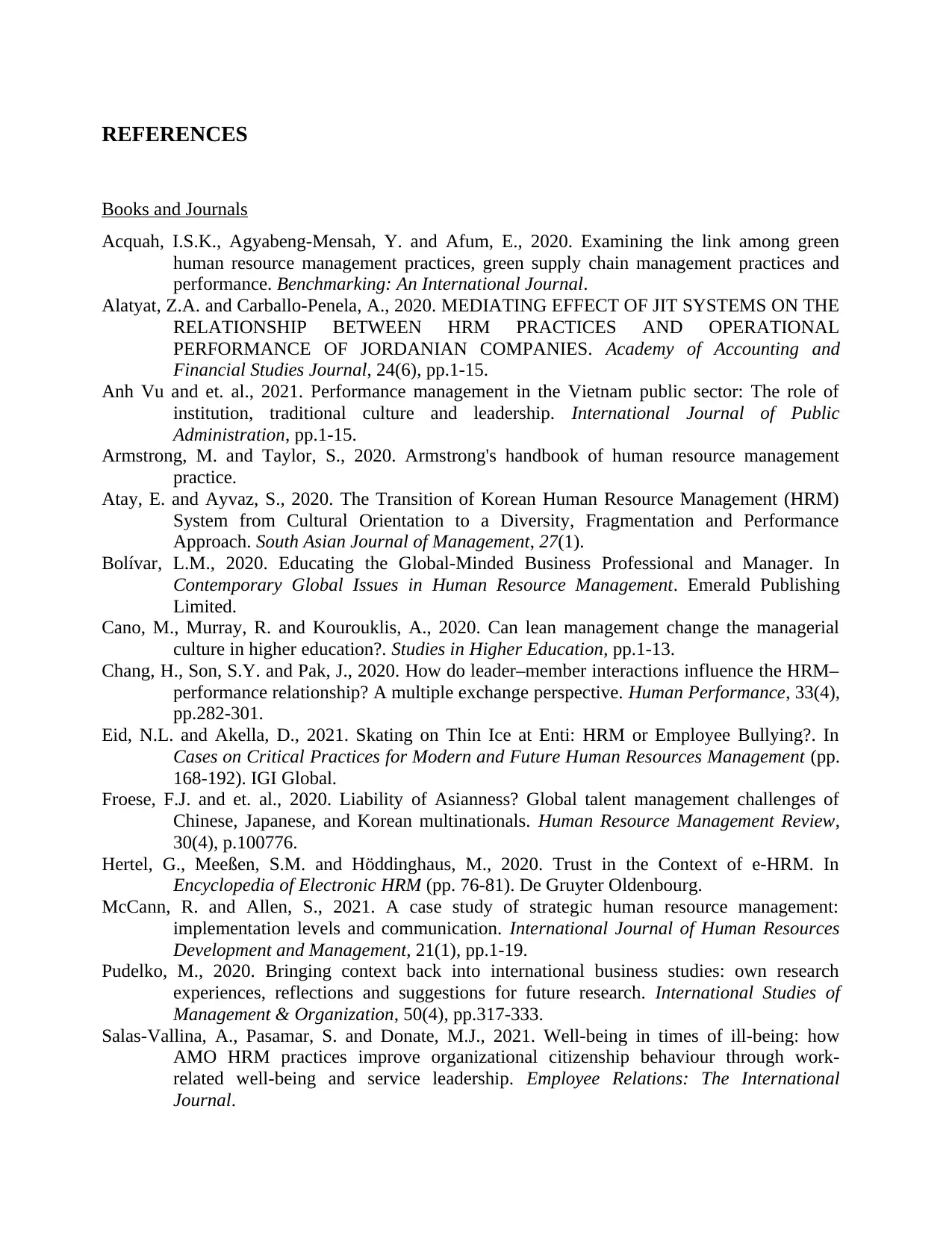
REFERENCES
Books and Journals
Acquah, I.S.K., Agyabeng-Mensah, Y. and Afum, E., 2020. Examining the link among green
human resource management practices, green supply chain management practices and
performance. Benchmarking: An International Journal.
Alatyat, Z.A. and Carballo-Penela, A., 2020. MEDIATING EFFECT OF JIT SYSTEMS ON THE
RELATIONSHIP BETWEEN HRM PRACTICES AND OPERATIONAL
PERFORMANCE OF JORDANIAN COMPANIES. Academy of Accounting and
Financial Studies Journal, 24(6), pp.1-15.
Anh Vu and et. al., 2021. Performance management in the Vietnam public sector: The role of
institution, traditional culture and leadership. International Journal of Public
Administration, pp.1-15.
Armstrong, M. and Taylor, S., 2020. Armstrong's handbook of human resource management
practice.
Atay, E. and Ayvaz, S., 2020. The Transition of Korean Human Resource Management (HRM)
System from Cultural Orientation to a Diversity, Fragmentation and Performance
Approach. South Asian Journal of Management, 27(1).
Bolívar, L.M., 2020. Educating the Global-Minded Business Professional and Manager. In
Contemporary Global Issues in Human Resource Management. Emerald Publishing
Limited.
Cano, M., Murray, R. and Kourouklis, A., 2020. Can lean management change the managerial
culture in higher education?. Studies in Higher Education, pp.1-13.
Chang, H., Son, S.Y. and Pak, J., 2020. How do leader–member interactions influence the HRM–
performance relationship? A multiple exchange perspective. Human Performance, 33(4),
pp.282-301.
Eid, N.L. and Akella, D., 2021. Skating on Thin Ice at Enti: HRM or Employee Bullying?. In
Cases on Critical Practices for Modern and Future Human Resources Management (pp.
168-192). IGI Global.
Froese, F.J. and et. al., 2020. Liability of Asianness? Global talent management challenges of
Chinese, Japanese, and Korean multinationals. Human Resource Management Review,
30(4), p.100776.
Hertel, G., Meeßen, S.M. and Höddinghaus, M., 2020. Trust in the Context of e-HRM. In
Encyclopedia of Electronic HRM (pp. 76-81). De Gruyter Oldenbourg.
McCann, R. and Allen, S., 2021. A case study of strategic human resource management:
implementation levels and communication. International Journal of Human Resources
Development and Management, 21(1), pp.1-19.
Pudelko, M., 2020. Bringing context back into international business studies: own research
experiences, reflections and suggestions for future research. International Studies of
Management & Organization, 50(4), pp.317-333.
Salas-Vallina, A., Pasamar, S. and Donate, M.J., 2021. Well-being in times of ill-being: how
AMO HRM practices improve organizational citizenship behaviour through work-
related well-being and service leadership. Employee Relations: The International
Journal.
Books and Journals
Acquah, I.S.K., Agyabeng-Mensah, Y. and Afum, E., 2020. Examining the link among green
human resource management practices, green supply chain management practices and
performance. Benchmarking: An International Journal.
Alatyat, Z.A. and Carballo-Penela, A., 2020. MEDIATING EFFECT OF JIT SYSTEMS ON THE
RELATIONSHIP BETWEEN HRM PRACTICES AND OPERATIONAL
PERFORMANCE OF JORDANIAN COMPANIES. Academy of Accounting and
Financial Studies Journal, 24(6), pp.1-15.
Anh Vu and et. al., 2021. Performance management in the Vietnam public sector: The role of
institution, traditional culture and leadership. International Journal of Public
Administration, pp.1-15.
Armstrong, M. and Taylor, S., 2020. Armstrong's handbook of human resource management
practice.
Atay, E. and Ayvaz, S., 2020. The Transition of Korean Human Resource Management (HRM)
System from Cultural Orientation to a Diversity, Fragmentation and Performance
Approach. South Asian Journal of Management, 27(1).
Bolívar, L.M., 2020. Educating the Global-Minded Business Professional and Manager. In
Contemporary Global Issues in Human Resource Management. Emerald Publishing
Limited.
Cano, M., Murray, R. and Kourouklis, A., 2020. Can lean management change the managerial
culture in higher education?. Studies in Higher Education, pp.1-13.
Chang, H., Son, S.Y. and Pak, J., 2020. How do leader–member interactions influence the HRM–
performance relationship? A multiple exchange perspective. Human Performance, 33(4),
pp.282-301.
Eid, N.L. and Akella, D., 2021. Skating on Thin Ice at Enti: HRM or Employee Bullying?. In
Cases on Critical Practices for Modern and Future Human Resources Management (pp.
168-192). IGI Global.
Froese, F.J. and et. al., 2020. Liability of Asianness? Global talent management challenges of
Chinese, Japanese, and Korean multinationals. Human Resource Management Review,
30(4), p.100776.
Hertel, G., Meeßen, S.M. and Höddinghaus, M., 2020. Trust in the Context of e-HRM. In
Encyclopedia of Electronic HRM (pp. 76-81). De Gruyter Oldenbourg.
McCann, R. and Allen, S., 2021. A case study of strategic human resource management:
implementation levels and communication. International Journal of Human Resources
Development and Management, 21(1), pp.1-19.
Pudelko, M., 2020. Bringing context back into international business studies: own research
experiences, reflections and suggestions for future research. International Studies of
Management & Organization, 50(4), pp.317-333.
Salas-Vallina, A., Pasamar, S. and Donate, M.J., 2021. Well-being in times of ill-being: how
AMO HRM practices improve organizational citizenship behaviour through work-
related well-being and service leadership. Employee Relations: The International
Journal.
Secure Best Marks with AI Grader
Need help grading? Try our AI Grader for instant feedback on your assignments.
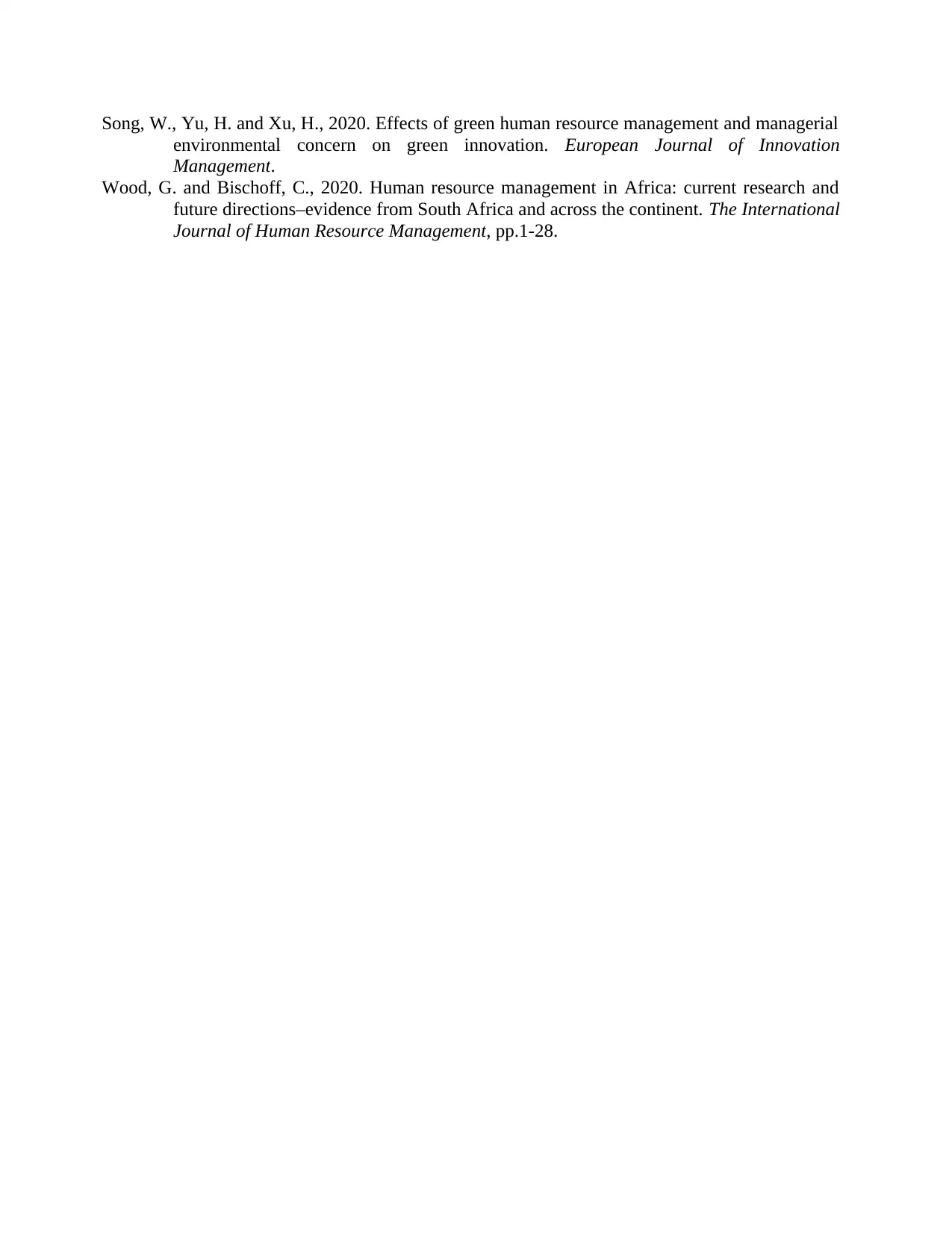
Song, W., Yu, H. and Xu, H., 2020. Effects of green human resource management and managerial
environmental concern on green innovation. European Journal of Innovation
Management.
Wood, G. and Bischoff, C., 2020. Human resource management in Africa: current research and
future directions–evidence from South Africa and across the continent. The International
Journal of Human Resource Management, pp.1-28.
environmental concern on green innovation. European Journal of Innovation
Management.
Wood, G. and Bischoff, C., 2020. Human resource management in Africa: current research and
future directions–evidence from South Africa and across the continent. The International
Journal of Human Resource Management, pp.1-28.
1 out of 11
Related Documents
Your All-in-One AI-Powered Toolkit for Academic Success.
+13062052269
info@desklib.com
Available 24*7 on WhatsApp / Email
![[object Object]](/_next/static/media/star-bottom.7253800d.svg)
Unlock your academic potential
© 2024 | Zucol Services PVT LTD | All rights reserved.




